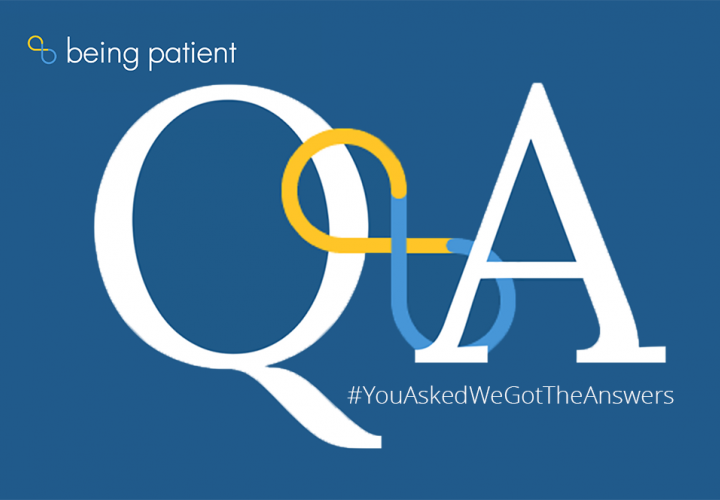Considering the growing evidence that Alzheimer’s can manifest early as sensory problems like sight and hearing loss, it’s not surprising that many Alzheimer’s caregivers and patients have questions related to vision problems. It can be difficult to determine whether symptoms are caused by Alzheimer’s or another issue, and what steps Alzheimer’s patients should take to treat symptoms. To help you understand the link between Alzheimer’s and eyesight, we spoke to Diane Bovenkamp, Ph.D., Vice President of Scientific Affairs at BrightFocus, an organization that examines research on Alzheimer’s, macular degeneration and glaucoma. She answered reader questions about how to prevent or treat vision problems, what resources you can turn to for help and current research on Alzheimer’s and eyesight.
Q: “What steps can Alzheimer’s patients take to alleviate symptoms that may be caused by eyesight problems, such as lack of spatial awareness, dizziness or difficulty balancing? For instance, these symptoms may occur after scrolling too fast while browsing the web; looking too quickly from left to right; or trying to reach for an object, but missing it—a sign patients may have lost their peripheral vision.”
A: There’s a lot of research that is being done by a number of investigators on the connection between vision issues and Alzheimer’s, and I think the jury’s still out there on whether vision is a direct result of Alzheimer’s, so they haven’t necessarily [connected] all the dots.
The risk of vision diseases and Alzheimer’s disease increases as we get older, and there may or may not be some kind of underlying vision issue. The peripheral vision issue may be caused by glaucoma. I would highly recommend they get to an eye doctor as soon as possible. If they don’t have an ophthalmologist, they can at least go to their optometrist.
[Dizziness issues] all depend on what part of the vestibular system [a series of structures in the inner ear that help with balance and spatial awareness] may be affected. Some people have vision and hearing problems, and depending on what part of the vestibular system is affected, you can get dizziness and vertigo, as well as vision issues.
If they have balance problems, you might want to go to the primary care physician, so they can go to an audiologist to get a hearing test, in case there’s a hearing issue. Sometimes balance issues can be the first indication that people have a hearing issue.
Q: “What online resources can Alzheimer’s patients or caregivers turn to if they are worried about vision issues or want to learn more about research on Alzheimer’s and eyesight?”
A: The first one that I would recommend would be the government. So there’s the National Eye Institute (NEI). The National Institute on Aging (NIH) also has information. It’s interesting to see what is currently in clinical trials. If you visit our website, we have partnered with Antidote, a company that has created an algorithm to search for clinical trials related to Alzheimer’s, glaucoma or macular degeneration, and you can search to see if people are doing clinical trials involving Alzheimer’s and eyes.
Q: “What is the current research on the link between Alzheimer’s disease and eyesight, and have researchers found that there is a connection between the two?”
A: There’s a lot of research that is being done on the connection between vision and Alzheimer’s. One of them was published this past summer, and it looks at using the eye as a way to diagnose Alzheimer’s. There isn’t necessarily a consensus right now, but the premise for that is that beta-amyloid [the toxic protein that forms plaques in people with Alzheimer’s disease] may or may not be gathering in the retina, because the retina is an extension of the brain. She gave patients this fluorescent form of curcumin that combined with the beta-amyloid [a process that makes it easier to see beta-amyloid in the retina], and when they looked in the eye with a typical machine you’d have in an eye doctor’s office, they were able to see the beta-amyloid in this very, very small 12-person clinical study. So this is kind of the first interesting window that’s being opened to maybe using this as a way for diagnosis and earlier diagnosis, so that there may be a way for earlier treatment. There’s also a review in Frontiers of Neuroscience that looks at current research on how the eye is being used to determine if people have Alzheimer’s disease.
There are some rare types of dementia that do affect vision. [This form of dementia is] called posterior cortical atrophy. As you know, with Alzheimer’s, you can get deposits of this beta-amyloid and the tau protein in various parts of the brain, and if it happens to deposit in the vision processing center of the brain, you could get some issues with vision. This particular dementia affects the vision and not necessarily the memory—at least in the earlier stages.
Q: “What are some steps people who have early-onset Alzheimer’s, or who are worried they may develop Alzheimer’s, can take if they want to prevent vision problems?”
A: I think that the strongest association with some form of prevention or reducing risk for Alzheimer’s is exercise, so the rule of thumb is, what’s good for your heart is good for your eyes. That means getting your annual eye checkup, but then also eating right and exercising.
And for your eyes, of course—the retina—the eyes are very sensitive to sunlight. When there’s bright light, when there are reflective surfaces, like when you’re skiing or skating, or when you’re out on the water on a boat—there’s a reflection where you can get double the amount of sunlight. So wear a broad-brimmed hat and protective sunglasses that have UVA and UVB protection.
This interview has been edited for length and clarity.


We have a 70 yo friend who is in the late stages of Alzheimer’s but still self-ambulating. Her ability to comprehend spoken word is severely impaired as is her ability to following directions. Is it possible to assess her vision and hearing? How would this be done? Thanks. wcb